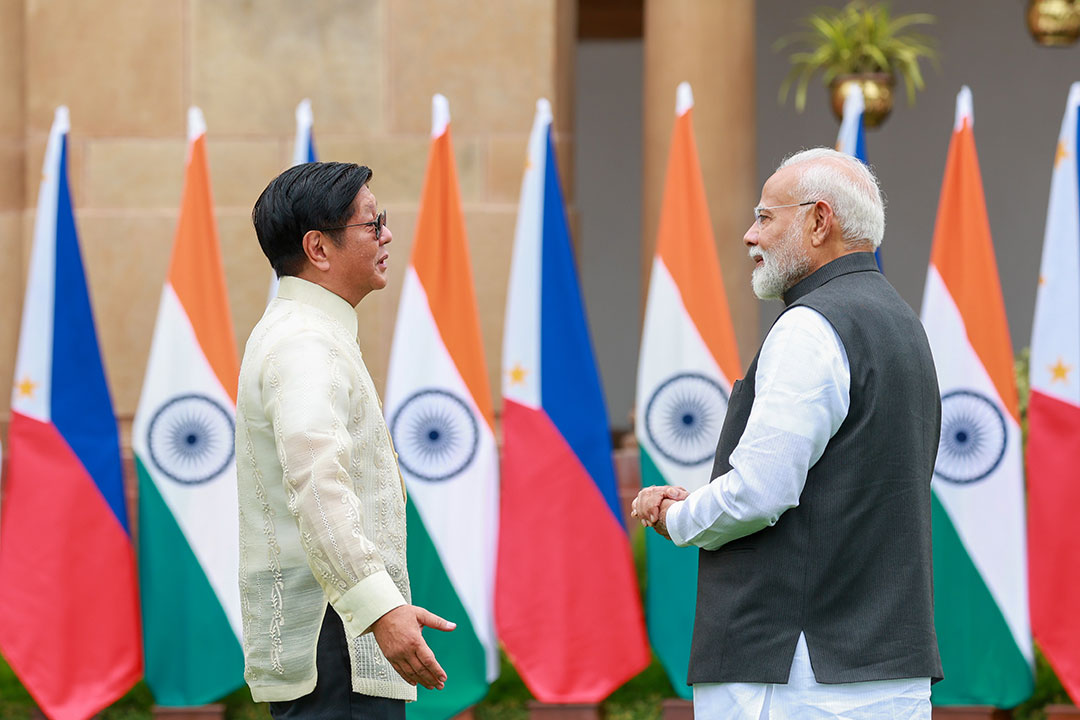
PRESIDENT Ferdinand R. Marcos, Jr. on Wednesday called on like-minded nations to take a stronger, more assertive role in defending the rules-based international order, warning that rising global tensions and the erosion of multilateral norms are endangering the post-World War II system.
Speaking at the Observer Research Foundation’s Indo-Pacific Oration in New Delhi, Mr. Marcos said traditional powers are becoming increasingly inward-looking, creating space for provocations that threaten global stability — particularly in the Indo-Pacific region.
“There are those who sometimes justify such provocations under the pretext of geopolitics,” Mr. Marcos said, according to an official transcript released by Malacañang.
He took particular aim at how the international community has treated disputes in the South China Sea, where the Philippines has maritime tensions with China.
“The complex issue of competing claims in the South China Sea has, for years, been unfortunately and simplistically reduced to ‘the South China Sea disputes,’ as if claims were all equal. They are not,” he said.
Mr. Marcos cited the importance of international law, citing the 1982 United Nations Convention on the Law of the Sea (UNCLOS) and the 2016 arbitral ruling that rejected China’s expansive claims in the disputed waterway.
He reiterated Manila’s commitment to upholding these legal frameworks and urged other nations to do the same.
His remarks came as the Philippines and India elevated their bilateral relationship to a strategic partnership during his five-day state visit to India.
The visit, which comes at a time of intensifying power competition in the Indo-Pacific region, has focused on strengthening cooperation in defense, trade and maritime security.
Mr. Marcos said India’s foreign policy reflects the type of trust and responsible behavior the Philippines seeks in its partners, contrasting it with what he implied was China’s increasingly provocative posture.
The visit also coincided with another point of contention: the fallout from China’s Aug. 4 launch of a Long March 12 rocket, which reportedly resulted in debris falling into Philippine waters between Puerto Princesa and the Tubbataha Reefs in the Sulu Sea.
“The Philippines notes with concern China’s launch,” said Foreign Affairs Secretary Ma. Theresa P. Lazaro, as quoted in an earlier Palace briefing.
The government has since said it would examine the incident further for any possible violations, while the Philippine Space Agency confirmed the debris drop zone was near the country’s maritime territory.
Mr. Marcos’ call to action reflects the Philippines’ broader strategy of diversifying its alliances and encouraging a coalition of democracies to push back against coercive behavior in the region.
About $3.36 trillion worth of global trade passes through the South China Sea annually, underscoring the economic and strategic stakes.
The Philippine leader is in India for a five-day state visit at the invitation of Prime Minister Narendra Modi. He met earlier this week with both Mr. Modi and Indian President Droupadi Murmu to reaffirm defense and economic ties between the two democracies.
India remains one of the Philippines’ most significant trading partners, with bilateral trade reaching $3.53 billion in fiscal year 2023–2024, up from $3.05 billion the year before, based on data from the Indian Embassy in Manila.
India exports engineering goods, auto parts, electronics, petroleum, steel, medicines, chemicals, rice, and meat to the Philippines. In turn, the Philippines exports electrical machinery, semiconductors, copper, lead, plastics, precious stones and animal feed.
The Philippines also imports about 20% of India’s pharmaceutical exports to Southeast Asia, making it a key partner in the region’s healthcare supply chain.
The state visit comes amid the 75th anniversary of diplomatic relations between the Philippines and India. In June, the Philippines started granting visa-free entry to Indian nationals, which is expected to boost tourism and business travel and further strengthen bilateral ties. — Chloe Mari A. Hufana